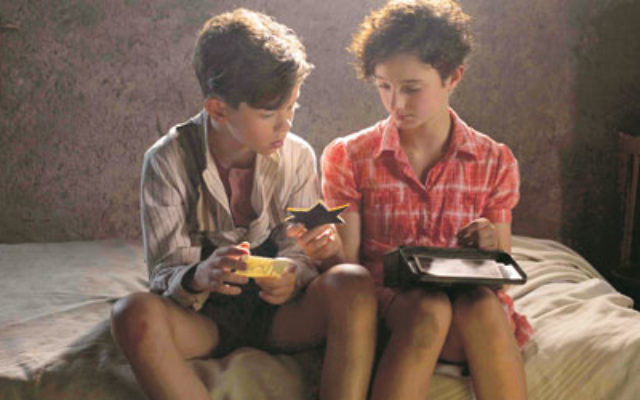Movies inspired by the Holocaust
WITH the success of last year’s inaugural Holocaust Film Series (HFS), director Eddie Tamir has put together a program of more than 30 films and documentaries for the 2015 festival to be held in Sydney and Melbourne from March 12-25.
Tamir, who is also director of the annual Jewish International Film Festival (JIFF), looked at more than 300 films at festivals in Israel, Cannes and Berlin in order to narrow down his selection.
“There has been a surge of Holocaust stories by new filmmakers from around the world who are still fascinated by the Holocaust, all these years later,” says Tamir.
“They tap into the themes of courage, tragedy, identity and hope, searching for positive and life-affirming elements.”
Tamir says that people are interested in seeing these films, which should ensure that the Holocaust Film Series becomes a regular feature on the community’s calendar.
He adds that there is also interest in the festival from non-Jewish filmgoers.
All the films that have been selected are being screened for the first time in Australia and were made in countries including Israel, Germany, France, the Czech Republic and the United States.
While there is no official opening to the Holocaust Film Series, the first film on the program is the German documentary Forbidden Films, made last year by filmmaker Felix Moeller.
The Third Reich produced more than 1200 feature films. Today, 40 of these films remain banned from public screening because of their extreme anti-Semitic content.
Moeller examines the ideology behind the banned Nazi films and interviews film historians and directors.
Tamir says: “Forbidden Films is a fascinating documentary that looks into why these propaganda films cannot be seen in public.”
Secrets of War is a wartime drama set in the Netherlands during the time of the Nazi occupation and revolves around two 12-year-old friends, Tuur and Lambert.
Their normal, carefree lives change with the arrival of an attractive girl in their class, and the realities of war come home when one of the boys is bullied over his family’s affiliation with the local Nazi party.
The German feature film A Blind Hero: The Love of Otto Weidt tells the story of the “unsung Schindler” Otto Weidt, who saved dozens of Jews from the Nazi death camps.
Weidt, the owner of a Berlin brush and broom factory, used cunning and his skills as a conman to outwit the Nazis and protect his staff, most of whom were Jewish and blind.
When Alice Licht, his former secretary with whom he had fallen in love, was deported to Auschwitz, he pursues her to the extermination camp in a desperate bid to free her.
The documentary Brundibar Revisited is set around a production of Brundibar – the children’s opera performed more than 50 times by Jewish children in the Terezin/Theresienstadt ghetto in 1943-44 – by a Berlin-based youth theatre group known as the Zwiefachen, made up of young people from different ethnic backgrounds who live on the fringes of society.
They undertake a trip to Terezin/
Theresienstadt to learn about the terrors of the Third Reich, and the conditions in which the opera played such a crucial role.
The group is accompanied by Greta Klingsberg, one of the few survivors of the original cast of Brundibar now living in Israel. She takes the young Germans on a trip back in time and, slowly, they start questioning their attitudes towards German history.
The French 2014 box office hit, Once in a Lifetime tackles the issue of Holocaust education as it tells the story of Anne Gueguen, a high school history teacher determined to give the best education to her tough and underprivileged pupils.
She enrols her class in a national competition around the theme “Children and teenagers in Nazi concentration camps”, and puts her own life on hold as she uses all her willpower to get her students involved in the project, with heartwarming results.
Oscar-winning director Stefan Ruzowitzky (The Counterfeiters) directs Radical Evil, a German documentary that probes the reasons why ordinary people become mass murderers.
Using dramatisation and historical reconstruction, interviews with researchers and the surprising results of psychological experiments, he looks into the Nazi death squads – the Einsatzgruppen – who shot about two million Jewish civilians in Eastern Europe during World War II.
The importance of life after the Holocaust and what it means to survivors is tackled in To Life, French director Jean-Jacques Zilbermann’s feature film about three young Jewish women, Helene, Rose, and Lili, who were all in Auschwitz but who haven’t seen each other since World War II.
When the three friends decide to reunite 15 years later on a holiday at Berck-Plage, it proves to be a joyous and nostalgic affair.
The film stars notable international actresses Julie Depardieu, Johanna ter Steege and Suzanne Clement.
The Holocaust Film Series is held from March 12-25 at the Classic Cinemas, Elsternwick and Event Cinemas, Bondi Junction. Bookings: www.jiff.com.au/hfs.
REPORT by Danny Gocs
PHOTO: A scene from Secrets of War.


comments